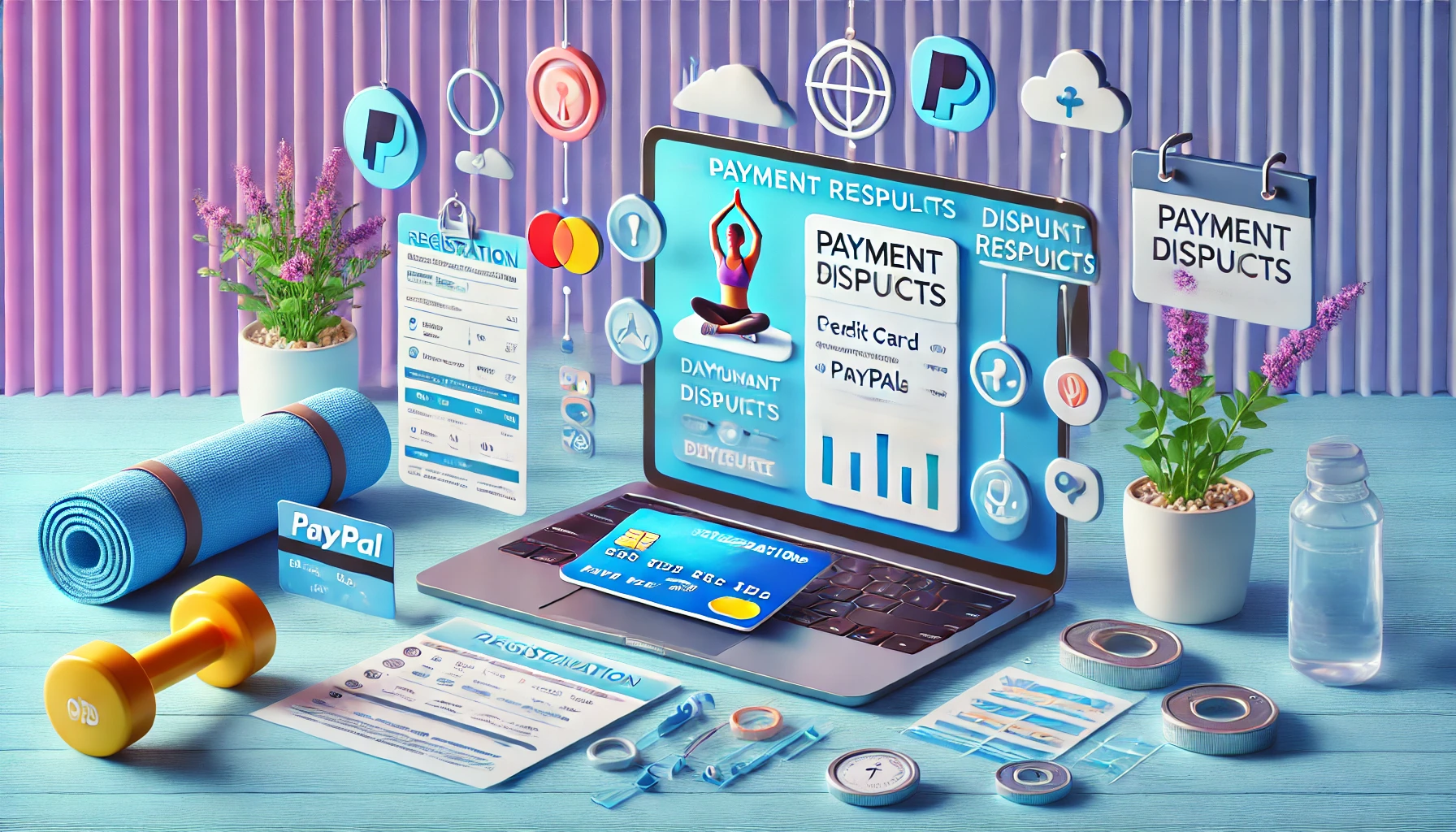
By dev October 27, 2024
When organizing a fitness event, one of the most crucial aspects is handling payment disputes. Payment disputes can arise due to various reasons, such as participant dissatisfaction, technical glitches, or misunderstandings. Failing to address these disputes promptly and effectively can lead to negative consequences for both event organizers and participants.
In this comprehensive guide, we will explore the common causes of payment disputes in fitness event registrations, essential steps to take before the event to prevent disputes, best practices for handling disputes as an event organizer, effective strategies for participants to resolve disputes, key tips for communicating with participants, and the legal considerations surrounding payment disputes.
By understanding and implementing these strategies, event organizers and participants can ensure a smooth and successful registration process.
Common Causes of Payment Disputes for Fitness Events

Understanding the common reasons for payment disputes can help you anticipate and mitigate them. Here are some typical causes:
- Technical Issues: Technical glitches can occur during the registration process, leading to payment disputes. These issues may include website crashes, payment gateway errors, or incorrect billing information. Participants may dispute payments if they encounter such problems, resulting in frustration and potential financial loss for both parties.
- Dissatisfaction with Event Experience: Participants may dispute payments if they feel that the fitness event did not meet their expectations. This dissatisfaction can arise from factors such as poor organization, inadequate facilities, or unfulfilled promises. Addressing these concerns promptly and effectively is crucial to prevent payment disputes.
- Misunderstandings: Miscommunication or misunderstandings between event organizers and participants can also lead to payment disputes. This can occur when participants have different expectations regarding event fees, cancellation policies, or refund processes. Clear and transparent communication is essential to avoid misunderstandings and subsequent disputes.
- Fraudulent Activities: In some cases, payment disputes may arise due to fraudulent activities. This can include unauthorized credit card charges, identity theft, or fake event registrations. Event organizers must have robust security measures in place to prevent fraudulent transactions and promptly address any disputes that may arise.
- Financial Constraints: Participants may dispute payments if they face unexpected financial constraints that prevent them from attending the fitness event. This can include job loss, medical emergencies, or other unforeseen circumstances. Event organizers should consider implementing flexible refund policies or alternative solutions to accommodate participants facing financial difficulties.
Preparing for Payment Disputes: Essential Steps to Take Before the Event

- Clear and Transparent Registration Process: To minimize payment disputes, event organizers should ensure that the registration process is clear and transparent. This includes providing detailed information about event fees, cancellation policies, refund processes, and any additional charges. Clear communication will help participants make informed decisions and reduce the likelihood of disputes.
- Secure Payment Gateway: Implementing a secure payment gateway is crucial to protect both event organizers and participants from fraudulent activities. Choose a reputable payment processor that offers robust security measures, such as encryption and fraud detection. Regularly update and monitor the payment gateway to ensure its effectiveness.
- Terms and Conditions: Clearly outline the terms and conditions of registration, including payment policies, cancellation policies, and refund processes. Participants should be required to read and accept these terms before completing their registration. This will help prevent misunderstandings and provide a legal framework for handling payment disputes.
- Customer Support: Establish a dedicated customer support system to address participant inquiries and concerns promptly. Provide multiple channels of communication, such as email, phone, and live chat, to ensure accessibility. Well-trained customer support staff can help resolve issues before they escalate into payment disputes.
- Documented Communication: Maintain a record of all communication with participants, including emails, phone calls, and in-person conversations. This documentation can serve as evidence in case of payment disputes and help resolve conflicts more efficiently. It is essential to maintain clear and professional communication throughout the registration process.
Handling Payment Disputes: Best Practices for Event Organizers
Even with preventive measures in place, payment disputes can still happen. Here’s a step-by-step guide to handling them effectively:
- Prompt Response: When a payment dispute arises, it is crucial to respond promptly. Acknowledge the participant’s concern and assure them that their issue is being addressed. Delayed responses can escalate the situation and damage the event’s reputation.
- Investigate the Issue: Thoroughly investigate the payment dispute to understand the participant’s perspective and identify any potential errors or misunderstandings. This may involve reviewing registration records, payment receipts, and communication history. Gathering all relevant information will help in finding a fair resolution.
- Offer Solutions: Once the issue has been investigated, offer appropriate solutions to the participant. This may include issuing a refund, providing a credit for future events, or addressing any other concerns raised. Tailor the solution to the specific circumstances of the dispute and aim to satisfy the participant’s expectations.
- Maintain Professionalism: Throughout the dispute resolution process, maintain a professional and respectful demeanor. Avoid becoming defensive or confrontational, as this can escalate the situation further. Show empathy towards the participant’s concerns and work towards finding a mutually beneficial solution.
- Learn from Disputes: Use payment disputes as an opportunity to improve your event registration process. Analyze the causes of disputes and identify areas for improvement. This may involve updating registration policies, enhancing communication channels, or implementing additional security measures. Continuous improvement will help prevent future payment disputes.
Resolving Payment Disputes: Effective Strategies for Event Participants

- Contact Event Organizer: If you have a payment dispute, the first step is to contact the event organizer directly. Clearly explain your concern and provide any supporting documentation, such as payment receipts or registration records. Give the organizer a reasonable timeframe to respond and resolve the issue.
- Be Polite and Assertive: When communicating with the event organizer, maintain a polite and assertive tone. Clearly state your expectations and desired resolution. Avoid becoming aggressive or confrontational, as this may hinder the dispute resolution process.
- Escalate the Issue: If the event organizer fails to address your payment dispute satisfactorily, consider escalating the issue. This may involve contacting higher-level management or seeking assistance from relevant regulatory bodies or consumer protection agencies. Be prepared to provide all necessary documentation and evidence to support your claim.
- Review Terms and Conditions: Review the terms and conditions of registration to understand your rights and obligations as a participant. Pay close attention to cancellation policies, refund processes, and any dispute resolution mechanisms outlined in the terms and conditions. This will help you navigate the dispute resolution process effectively.
- Seek Legal Advice: In extreme cases where the payment dispute remains unresolved, consider seeking legal advice. Consult with an attorney specializing in consumer rights or contract law to understand your legal options. They can guide you through the legal process and help protect your rights as a participant.
Communicating with Participants: Key Tips for Addressing Payment Disputes
- Active Listening: When addressing payment disputes, practice active listening. Allow participants to express their concerns fully and avoid interrupting or dismissing their grievances. This will help build trust and demonstrate your commitment to resolving the issue.
- Empathy and Understanding: Show empathy towards participants’ concerns and frustrations. Acknowledge their feelings and assure them that their issue is being taken seriously. This will help create a positive atmosphere for resolving the dispute.
- Clear and Transparent Communication: Maintain clear and transparent communication throughout the dispute resolution process. Clearly explain the steps being taken to address the issue and provide regular updates on the progress. Avoid using technical jargon or complex language that may confuse participants further.
- Timely Updates: Keep participants informed about the progress of their payment dispute. Provide regular updates on the actions being taken and the expected timeframe for resolution. Timely updates will help manage participants’ expectations and reduce their anxiety.
- Follow-Up: After resolving a payment dispute, follow up with participants to ensure their satisfaction. This can include sending a feedback survey or reaching out personally to inquire about their experience. Following up demonstrates your commitment to customer satisfaction and helps build a positive reputation for future events.
Legal Considerations: Understanding the Rights and Obligations of Event Organizers and Participants

- Contractual Obligations: The registration process for fitness events typically involves a contractual agreement between event organizers and participants. Both parties have certain rights and obligations outlined in the terms and conditions of registration. It is essential to understand these contractual obligations to navigate payment disputes effectively.
- Consumer Protection Laws: Consumer protection laws vary by jurisdiction and may provide specific rights and remedies for participants in payment disputes. Familiarize yourself with the relevant consumer protection laws in your jurisdiction to ensure compliance and protect participants’ rights.
- Dispute Resolution Mechanisms: Many event organizers include dispute resolution mechanisms in their terms and conditions. These mechanisms may include mediation, arbitration, or small claims court procedures. Understanding these mechanisms will help participants and event organizers navigate the dispute resolution process effectively.
- Refund Policies: Clearly outline refund policies in the terms and conditions of registration. Specify the circumstances under which refunds will be issued and any associated fees or penalties. Complying with refund policies will help prevent payment disputes and ensure fairness for all parties involved.
- Data Protection and Privacy: Event organizers must comply with data protection and privacy laws when handling participants’ personal information. Ensure that you have appropriate measures in place to protect participants’ data and obtain their consent for any data processing activities.
Frequently Asked Questions (FAQs)
Q1: What should I do if I encounter a technical issue during the registration process?
If you encounter a technical issue during the registration process, contact the event organizer immediately and provide details about the problem. They should be able to assist you in resolving the issue or provide alternative registration options.
Q2: Can I dispute a payment if I am dissatisfied with the fitness event?
If you are dissatisfied with a fitness event, it is recommended to first contact the event organizer directly to express your concerns. They may offer a resolution or address any issues raised. If the issue remains unresolved, you may consider escalating the dispute.
Q3: What are my rights as a participant in a fitness event?
As a participant, you have the right to receive the services and facilities promised by the event organizer. You also have the right to clear and transparent communication, fair refund policies, and protection of your personal data. Familiarize yourself with the terms and conditions of registration to understand your specific rights.
Q4: Can I get a refund if I am unable to attend a fitness event due to unforeseen circumstances?
Refund policies vary among event organizers. Some may offer partial or full refunds in certain circumstances, while others may have strict no-refund policies. Review the terms and conditions of registration to understand the refund policy for the specific event you are attending.
Q5: What legal options do I have if my payment dispute remains unresolved?
If your payment dispute remains unresolved, you may consider seeking legal advice from an attorney specializing in consumer rights or contract law. They can guide you through the legal process and help protect your rights as a participant.
Conclusion
Handling payment disputes for fitness event registrations is a key aspect of running a successful fitness business. By understanding the common causes of disputes and implementing preventive measures like clear communication, streamlined registration, and realistic expectations, fitness event organizers can reduce the occurrence of disputes. When disputes do arise, addressing them promptly and professionally, documenting the resolution process, and learning from the experience can help maintain a positive reputation and secure long-term success.
By following the strategies outlined in this guide, you can handle payment disputes effectively, ensuring a smooth and reliable experience for participants and safeguarding your fitness event’s revenue. Remember that every dispute is an opportunity to improve your processes and communication. Adopting a proactive approach to preventing disputes will save you time and resources while enhancing the trust participants place in your business.